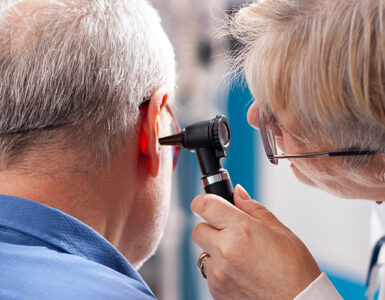Huntington’s disease is a rare, inherited neurological disorder that progressively impacts the brain and can affect every aspect of a person’s life.
While there is no cure for Huntington’s disease, early detection and supportive care can significantly improve the quality of life for those diagnosed and their families.
What is Huntington’s Disease?
Huntington’s disease (HD) is a genetic condition caused by a mutation in the HTT gene, which is passed down from one parent. It primarily affects the brain (it truly is a brain disease and does not affect other organs), leading to physical, cognitive and emotional symptoms. The disease causes the progressive breakdown of nerve cells in the brain, which over time can cause complications that are life-threatening
Huntington’s disease is considered rare. It’s estimated that three to seven people out of every 100,000 have the disease.
In about 90 percent of cases, symptoms typically appear between the ages of 30 and 50, although early-onset cases can occur in children or young adults.
The disease gets its name from Dr. George Huntington, who first described it in detail in the 1870s. While it was once known as “Huntington’s chorea” due to the involuntary movements associated with it, the name was updated to reflect its broader symptoms, which include behavioral and cognitive changes.
Stages of Huntington’s Disease
Huntington’s disease progresses through five stages, which can be divided into early, middle, and late stages. The latter stages are characterized by more severe symptoms than early-stage HD.
Early Stage
- Symptoms: Subtle changes in mood, coordination and cognition
- Common signs: Irritability, mild depression, clumsiness and difficulty concentrating
- Impact: Individuals may still function independently but begin to notice challenges in daily tasks
Middle Stage
- Symptoms: More pronounced functional decline and motor issues, such as involuntary movements (chorea), balance problems, eyes-related symptoms and difficulty walking
- Common signs: Cognitive decline and mood disturbances, including anxiety or aggression
- Impact: Daily activities require assistance and communication becomes more challenging
Late Stage
- Symptoms: Severe motor impairments, inability to walk, speak or swallow effectively
- Common signs: Cognitive abilities are significantly affected, often leading to dependency on full-time care. Chorea is often replaced by stiffness (rigidity), abnormal muscle contractions (dystonia) and slow movement (bradykinesia)
- Impact: Quality of life depends on palliative care to manage symptoms and ensure comfort
Early Onset Huntington’s Disease (Juvenile Huntington’s Disease)
This type occurs in people under 20 years old and accounts for about 5 to 10 percent of Huntington’s cases.
- Symptoms: Stiff movements, speech difficulties, behavioral changes and a decline in academic performance. Seizures are more common in early onset than in adult-onset cases
- Progression: The disease tends to progress faster in juvenile cases compared to adult-onset Huntington’s
Early Signs of Huntington’s Disease
The most common signs of Huntington’s disease include:
- Cognitive changes, including difficulty with focus, memory and decision-making
- Slower processing of information
- Trouble organizing or completing tasks
- Mood swings or irritability
- Depression or anxiety
- Strained relationships due to uncharacteristic behaviors
- Small, involuntary movements in the hands, feet or face (chorea)
- Lack of coordination or balance
- Clumsiness during everyday tasks
The initial symptoms of Huntington’s disease can vary widely depending on the person. This makes early detection challenging since symptoms can sometimes be mistaken for other conditions, such as bipolar disorder, anxiety, obsessive-compulsive disorder and rarely schizophrenia.
Early Huntington’s disease symptoms are often subtle and can include behavioral challenges or a decline in school performance in children. Someone with HD might have difficulty thinking or experience mood changes, work challenges and strained relationships with others.
As the disease progresses, other motor and movement symptoms often appear, usually affecting the hands, feet and face, causing trouble with balance and clumsiness. In its advantaged stages, HD can cause difficulty with everyday activities like walking, talking and swallowing.
How to Test for Huntington’s Disease
Diagnosing Huntington’s disease involves a combination of methods:
- Neurological examination: A thorough assessment of motor skills, reflexes, balance and cognitive functions can help healthcare professionals, such as neurologists and psychiatrists, to make a diagnosis.
- Review of family history: Since HD is genetic, understanding a family’s medical history is important for understanding someone’s risk, although an accurate family
- Genetic testing: This is a definitive way to confirm the presence of the Huntington’s gene mutation. However, not all people with the gene will develop symptoms, and the decision to undergo genetic testing should be made carefully. Every child of a parent with HD has a 50/50 chance of inheriting the faulty gene that causes the disease. For those considering genetic testing, it’s recommended to work with a genetic counselor who can help interpret the results and discuss their implications.
Is There a Cure for Huntington’s Disease?
Currently, there is no cure for Huntington’s disease or any known treatment that can completely slow its progression. However, there are therapies and interventions available to help manage HD symptoms and improve quality of life.
Specialists like neurologists, psychiatrists and genetic counselors are often involved in the care of Huntington’s patients. Early and ongoing management can significantly impact daily living and mental well-being.
Treatment options for Huntington’s disease can include:
- Medications: These can help control symptoms such as mood swings, depression, anxiety and chorea (involuntary movements, such as tremors and tics)
- Physical and occupational therapy: Aids in maintaining mobility and independence
- Speech therapy: Addresses communication and swallowing difficulties
- Supportive counseling: Helps individuals and families cope with the emotional challenges of living with Huntington’s disease
Stony Brook Medicine is proud to offer comprehensive care for individuals living with Huntington’s disease. As one of the Huntington’s Disease Society of America-designated Centers of Excellence, our multidisciplinary team includes experts in neurology, psychiatry, physical therapy and speech pathology. Stony Brook was recently ranked in the top four percent nationally in neurology and neurosurgery. Our team provides access to cutting-edge treatments, clinical trials, and support groups to ensure the best possible care for patients and their families.
If you’re concerned about Huntington’s disease or have a family history of the condition, contact our team for personalized guidance and care.












